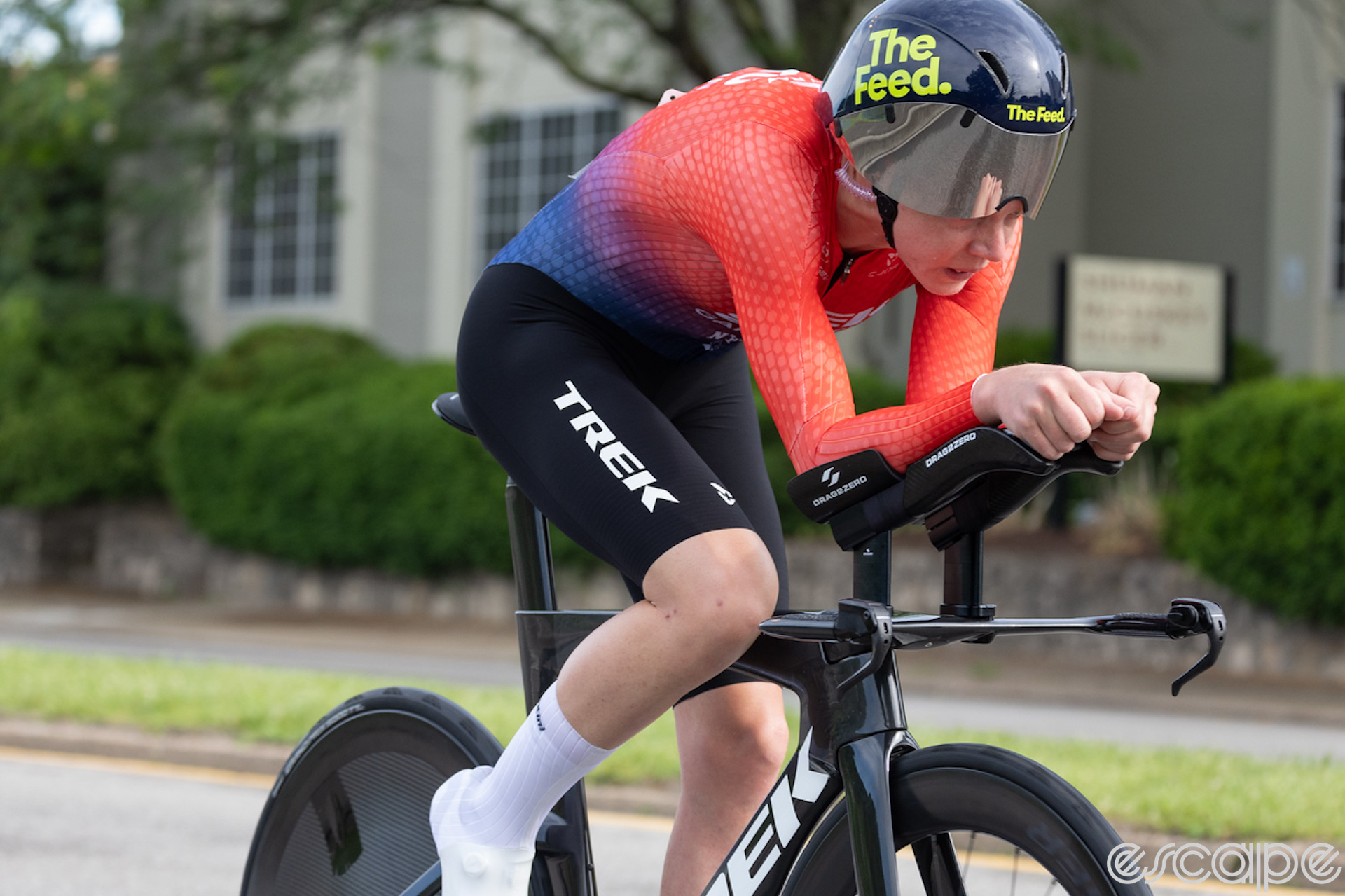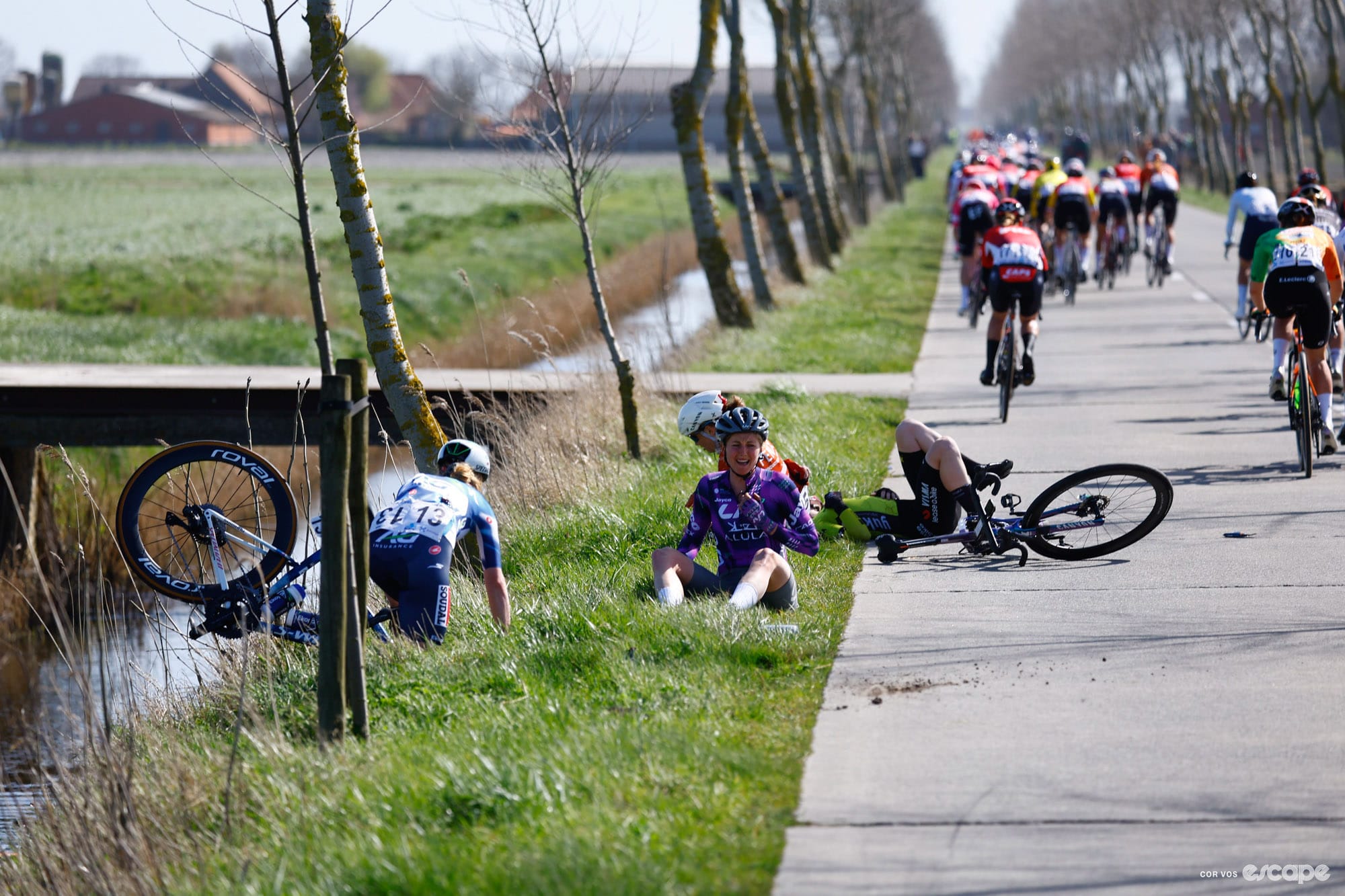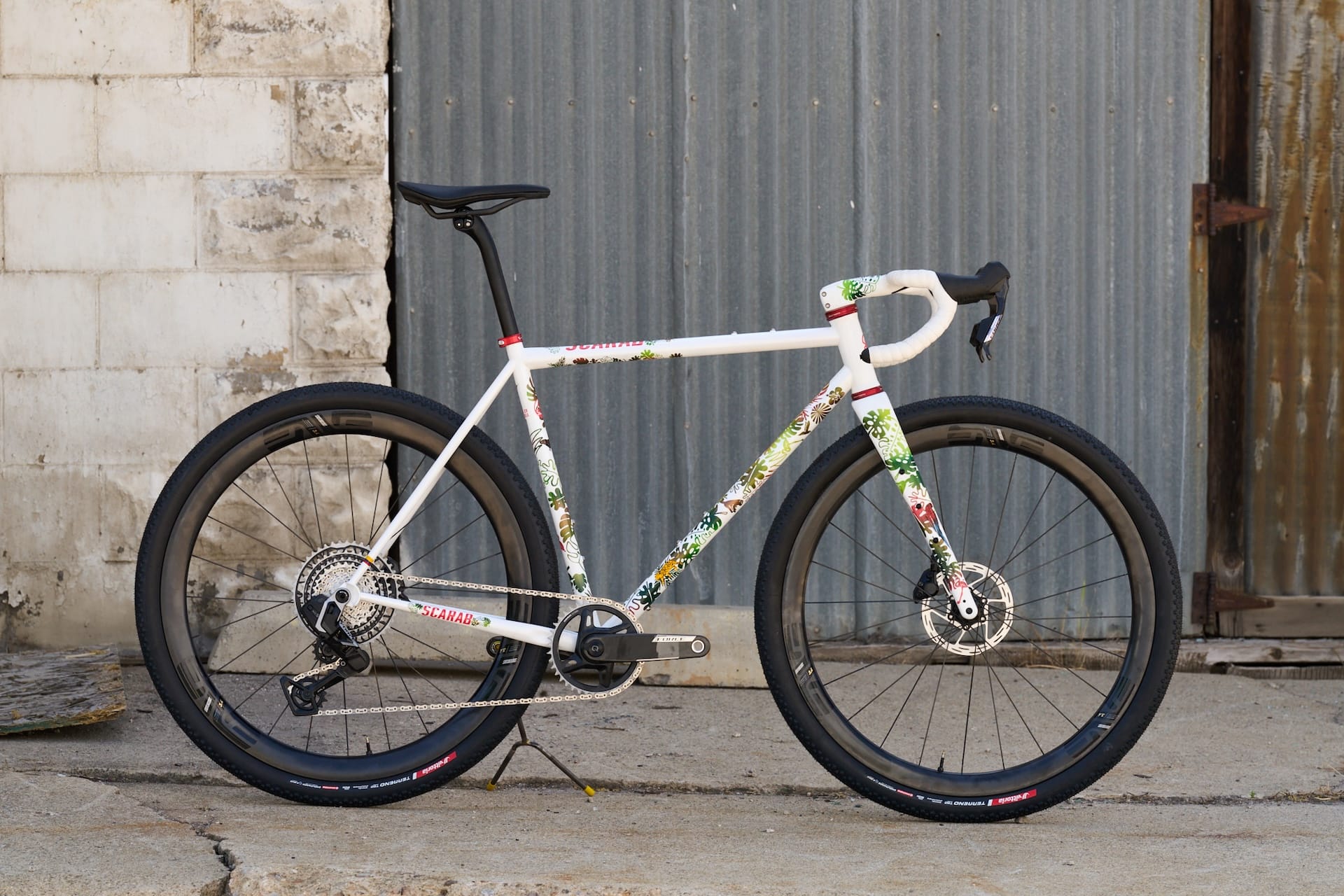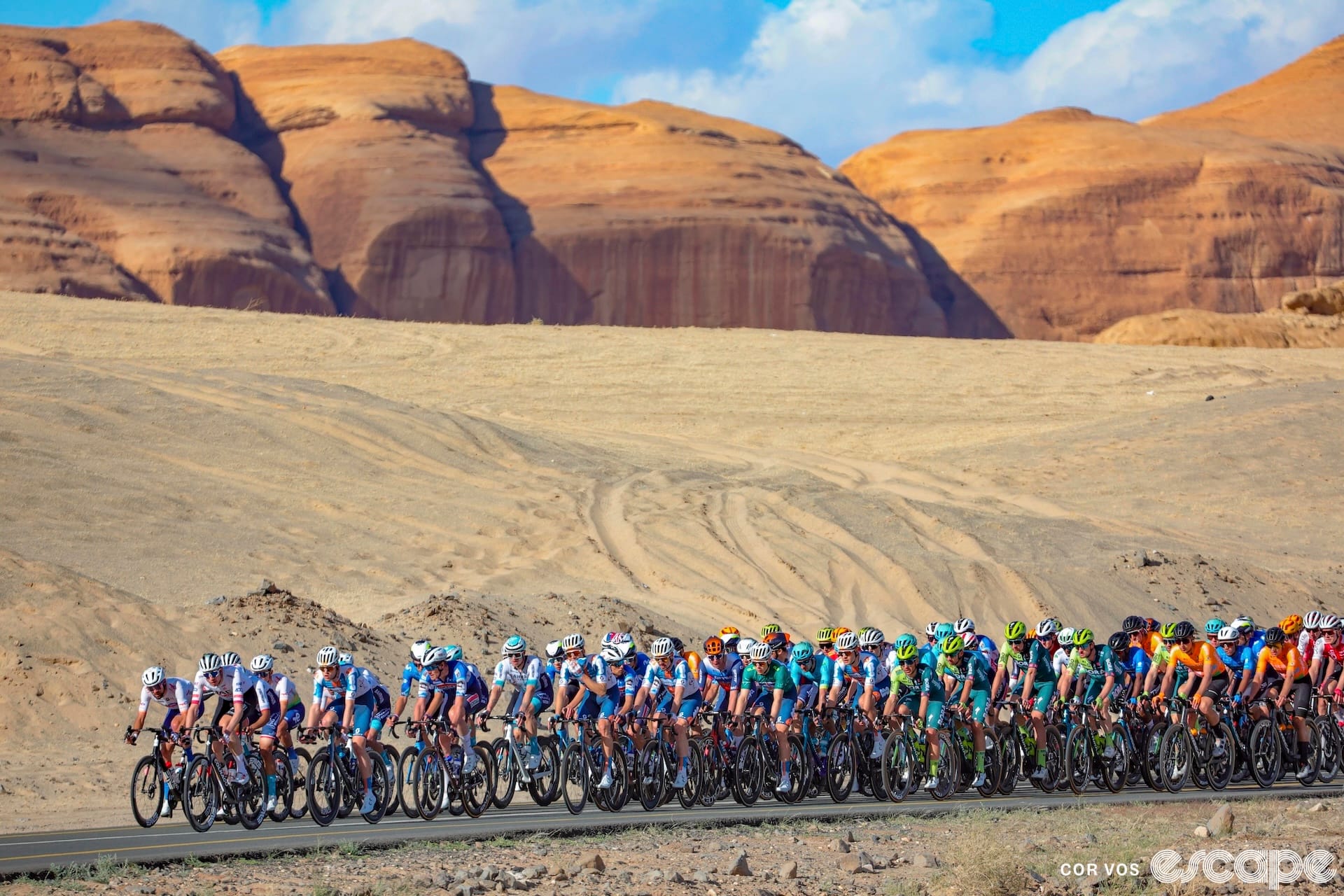To hear Taylor Knibb tell it, had things gone a bit different she might have been a pro cyclist.
Back in 2019, the triathlete was “in the middle of school and just not loving triathlon or anything to do with racing triathlon” when her coach at the time, Neal Henderson, suggested that bike racing was an option “if I wanted to focus on it.”
Henderson – a longtime endurance sports coach who has counted top pro cyclists Taylor Phinney and Evelyn Stevens among his clients – would know. Ultimately, Knibb said, she opted to stick with triathlon, but Henderson’s comment piqued her interest, and planted the seeds of what, five years later, would result in one of the most stunning performances in recent American cycling.
Last week, the 26-year-old Knibb upset pre-race favorites Kristen Faulkner and Amber Neben to win the U.S. National Time Trial Championship on its new course in Charleston, West Virginia. Along with that came the second and final automatic qualifying spot for the two-rider women’s Olympic road team – a spot widely expected to go to Faulkner, a solid time triallist who is in the midst of an excellent season, with a recent stage win at the Vuelta España Femenina.
Instead, it’s Knibb who gets the nod. Not only that: as she’s already qualified for the U.S. national triathlon team for the Paris Games, she joins an elite club of just over 1,000 athletes to ever compete in more than one sport in the Olympics.
And Knibb is even more unusual in that many of those athletes competed in sports that are technically different but highly similar: track and road cycling, for instance, or marathon swimming and short-distance. Those are impressive achievements, for sure. But far fewer athletes have qualified in different sports entirely, and fewer still have done it in the same Games; Czech wintersports athlete Ester Ledecká, who won gold medals in both skiing and snowboarding in 2018, may be the most recent.
All of which is to say that before she even gets to Paris, Knibb has scored a remarkable accomplishment. What’s more, it’s not one she meticulously planned.
“My interest in Time Trial Nationals specifically actually came about due to a foot injury that kept me from running in the summer of 2022,” she told Escape Collective via e-mail as she was traveling to her next triathlon race, the World Triathlon Series round in Cagliari, Italy.
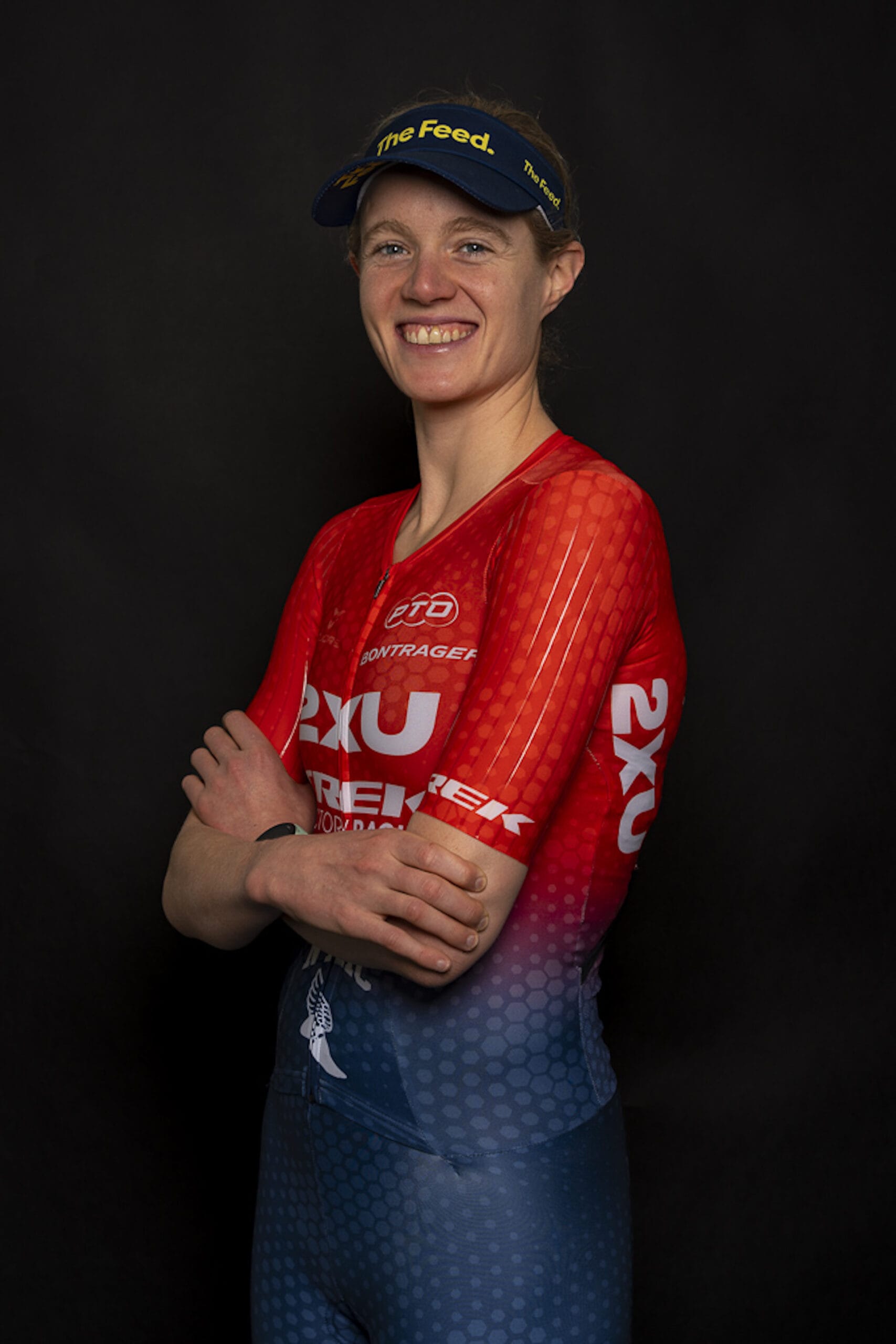
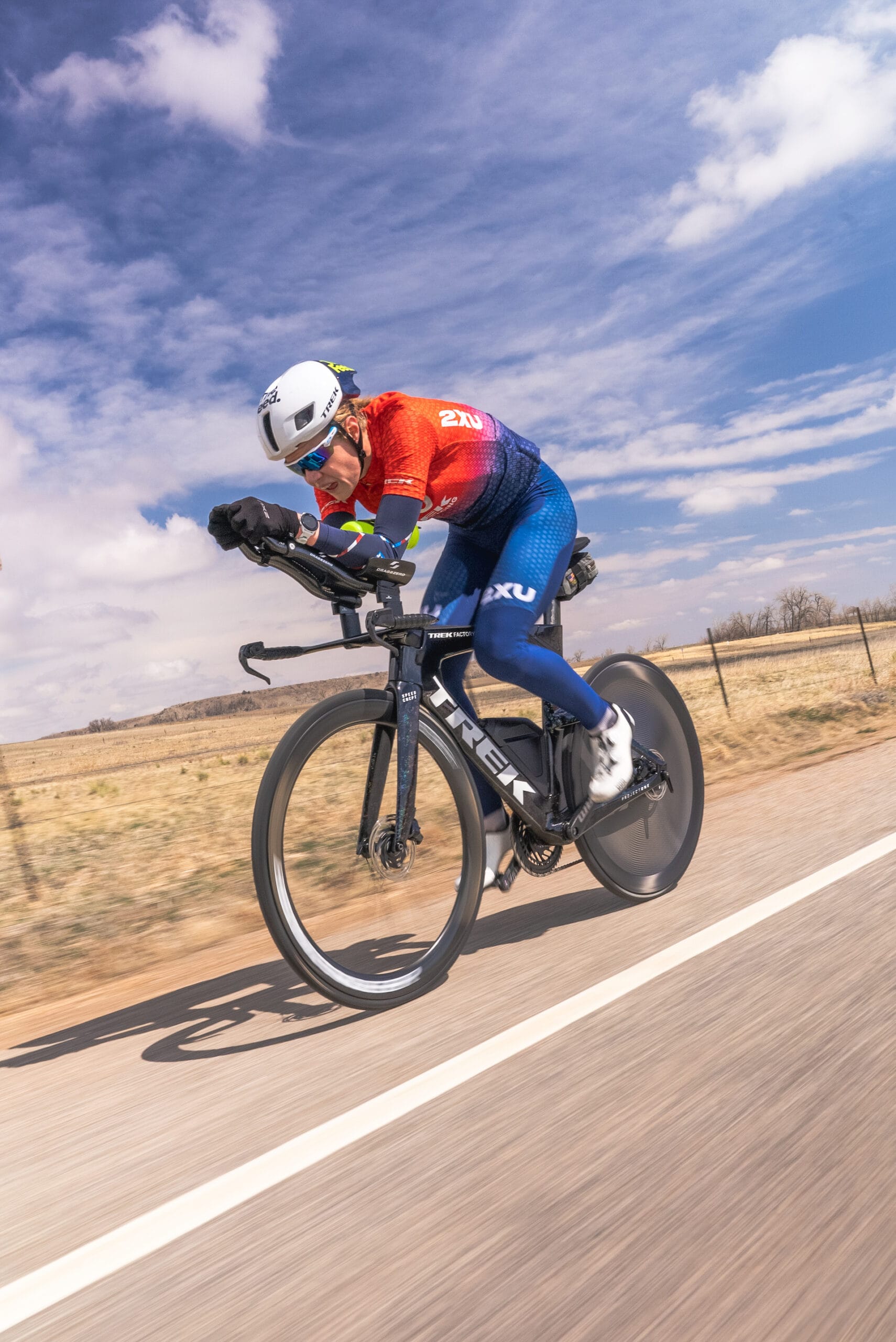
Unable to run, she focused most of her training on the bike, but had to pull out of most of her planned triathlons that year. “One afternoon ride, I was just itching to race and I remember thinking: ‘I wonder when Time Trial Nationals are,'” she said. It turned out they were the next day. Oh well.
But with the foot injury stubbornly persisting (it required surgery in January 2023), Knibb again began to look at alternate competitions she could do. “I didn’t know how long the foot would take to heal and how long it would take to get back to running and racing triathlons,” she said. “I figured (nationals) could give me a nice goal to get through February-June.” Her foot ended up healing quickly, but she decided to race just to see. She finished fourth.
USA Cycling had published its qualification criteria for the Olympic road team that January, and it featured a clear focus on time trial results, where the U.S. has historically had success and may again with Chloe Dygert. Dygert, as it happened, picked up the first spot on the road team with her World Time Trial Championship last August. But when no riders satisfied any of the other automatic qualifier criteria – which included winning a one-day Women’s WorldTour race, but not a stage of a WWT event like Faulkner’s Vuelta victory – that left TT nationals as a kind of last-chance qualifier. The winner – whomever it was – would get that second spot for Paris. With sharp limits on the number of athletes each country can bring to the Games (just 35 riders total will race the women's time trial, for instance) competition for those start spots is fierce, but Knibb's ride wasn't on the list of likely outcomes, even for her.
Knibb was aware of the automatic Olympic spot for the winner, and said “the possibility of the opportunity definitely contributed to me racing Time Trial Nationals this year.” But, she added, “it wasn’t a clear goal with my team to qualify for the Olympics in cycling,” noting that “there are so many strong American female cyclists.” (Indeed, had she ridden just six seconds slower and Faulkner six seconds faster, this story doesn't exist.) In fact, Knibb said she did little nationals-specific preparation outside of doing some specific training rides on her Trek Speed Concept bike with a UCI-legal position set up by fitter Matt Bottrill.
But then she did win, which means she probably won’t have much time in Paris to sightsee. The women’s individual time trial is July 27, followed four days later by the women’s triathlon on the 31st. The cycling road race is August 4 and the triathlon team mixed relay – in which she has a silver medal from Tokyo – is August 5.
Knibb is used to tight competition turnarounds: just days before her win in Charleston she podiumed in a triathlon in Yokohama, Japan, and then of course jetted off to Italy for this week’s triathlon. And she said that the training for a TT and triathlon aren’t that different, which is part of how she won nationals. “Luckily, a 33.7 km time trial [the distance at nationals and close to the flat, 32.4 km Paris course – Ed.] uses a very similar energy system as the one that I’ve been focusing on for an Olympic distance triathlon,” she points out, crediting her current coach, Dan Lorang, for devising a “fantastic” training plan.
But that does raise a question: what about the road race? That course is 158 km and will feature 1,700 meters of elevation gain, including three laps of the hilly Butte Montmarte circuit. In a pack with 89 other starters, on a technical urban course, in a discipline in which Knibb has little experience.
Knibb said that “I haven’t made an official decision yet. But Dan and I have agreed that I shouldn’t do the road race.” She notes she’s never done a cycling road race before, and that the triathlon relay – a strong medal opportunity for the U.S. triathlon team – is the next day. That leaves the second road race spot open, and with USAC announcing a long list for the Olympic track team that includes Faulkner – who recently began track racing and was part of the U.S. national team pursuit squad at the February round of the UCI Track Nations Cup – it looks at least possible that the EF Education-Cannondale rider will split duty between that track event and the road race. (Dygert, who's also on that long list, may be even busier if she does track, the TT, and the road race.)
But Knibb absolutely plans to race that time trial. Does she harbor dreams of a medal? Knibb won’t tip her hand, saying only that “my team’s aim is for me to execute the best race possible each day.”
Even if she doesn’t medal, a good result might raise more questions about her athletic future, which of course calls back to that long-ago conversation with Henderson. Does pro cycling hold allure for Knibb?
The two-time Ironman 70.3 series champion said that “right now, I really love triathlon,” and “there is still a lot I would like to explore in the sport,” citing the level of autonomy and control she has over her race calendar and goals. Road racing is a team sport, where those personal goals often have to be subsumed for the team.
It's unlikely, then, that Knibb would engineer some kind of mid-career switch. But she won’t rule it out. “I don’t want to close any doors, if possible, ever,” she said. “So all I can say is how I feel right now. That could change in a day or it could remain the same for decades. I’m just grateful for the opportunities I have right now.”
Did we do a good job with this story?

